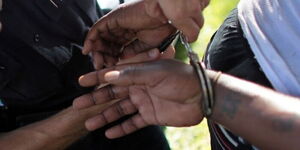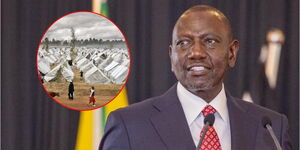On March 4, 2013, Kenya successfully concluded peaceful elections under the new Constitution of Kenya 2010, ushering in new leadership brimming with hope in a devolved form of government.
President Uhuru Kenyatta and Deputy President William Ruto, at the apex of this leadership, were faced with the unenviable task of revamping the country's economy and implementing the new constitution while seeking to deliver on the countless promises made to Kenyans during their campaign.
Observant Kenyans do remember the details of an important event held on February 3, 2013. It was the day when the Jubilee coalition, then composed of The National Alliance, The United Republican Party, the National Rainbow Coalition and the Republican Congress Party of Kenya launched their manifesto, a document built on three pillars; Umoja, Uchumi and Uwazi.
This two-part series examines their promises against their actual achievements to date. Was the Jubilee manifesto just a blank document of perceived promises, a tool to excite a section of Kenyans thirsty for new stuff or was it, as described in some quarters, just an assemblage of lies crafted by devious hype amateurs out to lure Kenyans, or was it indeed an intentional statement of purpose by a coalition in touch with the aspirations of the Kenyan populace?
President Uhuru's government laid out important plans they were keen on implementing such as keeping Kenya safe and secure from terrorists; making the country a strong trading partner in Africa; securing Kenya’s legacy as a sporting nation and celebrating its culture; building a healthier Kenya; empowering youth and women; increasing social protections; building an enterprise economy; promoting tourism; securing Kenya’s energy supply; enhancing agriculture and food security; protecting Kenya’s environment; providing decent housing for all; creating a world-class transport and infrastructure system; improving governance and securing devolution.
When the party launched its pre-election manifesto in 2013, it said there was one police officer serving 1,150 Kenyans, promising to lower this ratio to 1:800 in its first term.
The police-to-population ratio refers to the number of police officers serving a community, relative to its size. For example, if a community has 1 police officer serving 100 people, the ratio is 1:100.
The UN defines police personnel as “those whose principal functions are the prevention, detection, and investigation of crime and the apprehension of alleged offenders”. In its database, it thus counts only officers of the Kenya Police Service who are locally known to as the regular police.
Data from the Kenya National Bureau of Statistics show there were 42,145 police officers in the service in 2013, against an estimated population of 41.8 million. This translates to a ratio of 1:992.
In terms of economic gains, the country's financial situation appears to be worse off compared to their economic well-being during former President Mwai Kibaki’s regime, according to the latest Prosperity Index.
The index, launched by the Legatum Institute, a London-based think-tank, gives Kenya a score of 37.5 compared to 39.3 in 2009 on economic quality - which measures the strength of the economy in generating wealth for its workforce.
Kenya was pulled down by mounting public debt and reduced savings among its workforce plagued by job cuts, stagnant wages in a business environment where companies have ushered in austerity measures to protect profits.
The number of formal jobs generated by the economy fell to a six-year low in 2018, worsening the plight of school leavers in the year that the Jubilee administration recorded its best economic performance with growth of 6.3%.
"If you look at employment index (in the PMI) since the beginning of 2017, it’s been quite neutral meaning it’s not like there has been improvement in new jobs," said Jibran Qureishi, regional economist for East Africa at Stanbic Bank—which tracks company performance monthly through the Purchasing Managers’ Index (PMI).
His sentiments were backed by the massive lay-offs witnessed in the country in 2019.
The public debt crossed the Ksh6 trillion mark in July, up from Ksh1.89 trillion in June 2013, a growth that has sparked concerns that the ballooning loans risk hurting the economy due to a huge debt repayment burden.
It would seem as if instead of service delivery, the president and his deputy seem to have excelled in not how to effectively implement government projects, but in reward loyalists.
Kenyans have been quick to point out how Uhuru's cabinet appointments have seemed to be tokens of appreciation to individuals perceived to have contributed to the success of the Jubilee coalition's election into power - Key among the beneficiaries being several 2017 poll losers including former governors and MPs.
In the Education sector, Uhuru's appointment of Fred Matiang'i and later on Julius Magoha at the helm of the crucial docket has seen significant improvement, primarily in the administration of national examinations with cases of irregularities dramatically reducing and the lowering of university cut-off points occasioned, in part, by the sponsorship by government of eligible students in private universities.
This particular milestone featured in his 2019 New Year's Eve speech among several other milestones his administration prides itself in.
"In 2019, we experienced God’s bountiful provision, as our country’s profile continued to soar through the world-beating performances of our sportspeople; groundbreaking research-findings and innovations by our scientists and researchers and our much-improved rankings in the World Bank Ease Of Doing Business Index;
"Our fight for environmental protection and renewable energy and our fight against corruption; our leadership in areas of international peace and diplomacy; and our recognised position as the continental leader in education, as evidenced through the 100% transition from Primary to Secondary School."
In the Health sector, President Uhuru's administration's ambitious Universal Health Coverage (UHC) program that received the backing of the World Health Organisation (WHO) was piloted in Kisumu, Machakos, Isiolo and Nyeri counties from December 2018.
In July 2019, the Ministry of Health constituted a UHC secretariat to oversee the national rollout of the program headed by the head of the National Malaria Control Programme (NMCP), Rebecca Kiptui. However, these grand plans seem to be consistently undercut by several corruption scandals in the Health ministry including the NHIF scandal as well as the controversial Ksh63 billion Managed Equipment Services program with county governments.
Part two dissects various other sectors such as power grid coverage and infrastructural development.












